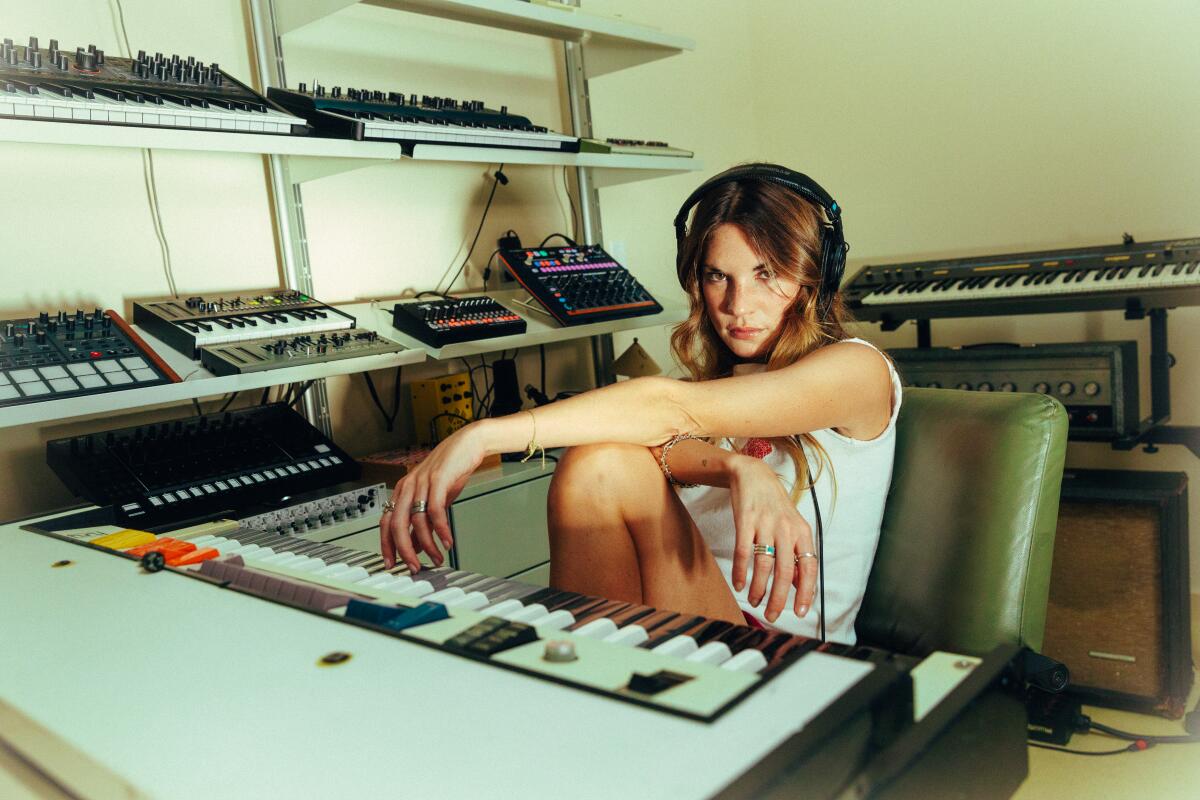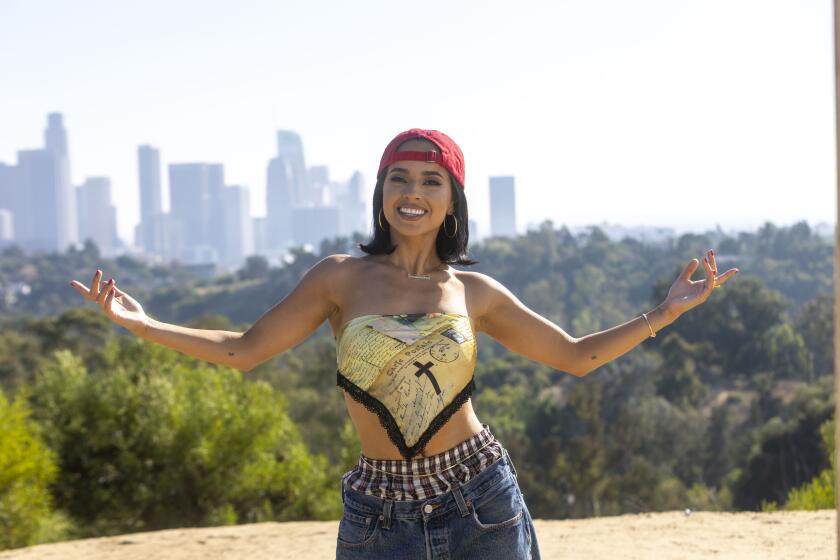How songwriter Amy Allen became ‘the first ask for anybody in pop right now’

- Amy Allen is part of a crucial shift in modern pop songwriting. What’s driving it?
- In addition to her work for some of pop’s biggest acts, Allen released a solo debut of her own last month.
As a songwriting student at Boston’s Berklee College of Music in the mid-2010s, Amy Allen had a teacher whose ideas about lyrics included the conviction that words must not be improperly stressed. Among the instructor’s object lessons: Katy Perry’s 2013 single “Unconditionally,” in which Perry puts the emphasis on that word’s fourth syllable — “un-con-di-tion-al-ly” — in order to ride the song’s throbbing groove.
“This teacher said, ‘You should never do that,’” Allen recalls. “But I was like, I think people love when you do that because it’s weird and funny and hooky. It makes you remember the song more because it’s not correct.”
Turns out Allen was right about being wrong: Nine years after she graduated from Berklee to become a professional songwriter in Los Angeles, Allen, 32, has built a career penning idiosyncratic pop hits that people — many millions of them — can’t stop listening to. Since 2018 she’s helped create half a dozen top 10 singles for the likes of Harry Styles (“Adore You”), Tate McRae (“Greedy”) and Halsey (“Without Me”); for the last seven weeks, three separate songs she co-wrote for Sabrina Carpenter’s “Short n’ Sweet” album have been lodged near the top of Billboard’s Hot 100, including “Espresso,” which has racked up more than 1.4 billion streams on Spotify, and “Please Please Please,” which reached No. 1 in just its second week on the chart.
Allen’s writerly eccentricities vary from song to song. Sometimes it’s a daffy, hard-to-parse turn of phrase like “That’s that me espresso”; sometimes it’s an unexpected burst of profanity like the “motherf—” Carpenter drops in “Please Please Please.” In “Lie to Girls,” another song from “Short n’ Sweet” — Allen is credited on all 12 of the LP’s tracks — it’s the jolting honesty of a painful romantic confession: “You don’t have to lie to girls,” Carpenter tells a guy she knows is no good for her, “If they like you, they’ll just lie to themselves.” (So much resignation, so few words.)
For the sibling pop savants, work and family have long been intertwined. They’ve proved it with their most autobiographical album, ‘Hit Me Hard and Soft,’ a strong contender for the 67th Grammy Awards.
Stylistically, too, the songs Allen writes can end up all over the place, from “Espresso’s” fizzy disco to “Adore You’s” humid soul-rock to whatever it is that’s happening in the twangy and twinkling “Please Please Please.” Last month she released a self-titled album of her own, with her breathy vocals against atmospheric indie-folk arrangements à la Boygenius or Lizzy McAlpine. She can even do country music, as in the handful of tunes she co-wrote for the latest album by the troublemaking Texas singer Koe Wetzel.
What connects all of her work is an embrace of the just slightly off that gives the music an intimate sense of personality — Allen’s, yes, but more so that of the artist performing the song. To listen to a tune she helped compose is to believe that the singer in question is the only person who could’ve sung it.
“‘Espresso’ and ‘Please Please Please’ and ‘Slim Pickins,’ they’re so authentic to who Sabrina is,” Allen says, referring to a third Carpenter song in which the former Disney star — one of the great eye-rollers in modern pop — bemoans the fact that she’s ended up in bed with a boy who “doesn’t even know the difference between ‘there,’ ‘their’ and ‘they are.’” “Nobody’s doubting it for a second,” Allen adds. “She talks exactly the way she writes.”

Now, following four weeks atop the Billboard 200, “Short n’ Sweet” is broadly tipped to land high on the Grammy Awards ballot when nominations are announced Nov. 8; Allen herself could score a nod for songwriter of the year — her second time in that category after her work with Styles, Lizzo and Charli XCX earned her a nomination in 2023.
“Amy’s the first ask for anybody in pop right now,” says Julian Bunetta, who produced “Espresso” and has also crafted hits for One Direction and Teddy Swims. “When you go on a run like the one she’s been on, it’s like there’s a cosmic alignment between whatever she’s doing and whatever the world is looking for.”
Indeed, Allen’s success is part of a larger shift in pop music away from perfect polish and toward lifelike mess: Think of the startling psychological candor of a song like Chappell Roan’s “Good Luck, Babe!” or of the rough-edged electronic textures Charli XCX deploys on her album “Brat”; consider the knotty structures of the songs on Billie Eilish’s “Hit Me Hard and Soft” or the way Taylor Swift leans into her most chaotic tendencies on the year’s biggest LP, “The Tortured Poets Department.”
The feeling you get across these hits is not merely a refusal to smooth out the kinks that a decade ago might not have been welcome on Top 40 radio — it’s that a given star’s signature quirks are now the thing her songs are built around.
Nominations for the 67th Grammy Awards will be announced on Nov. 8 with the ceremony itself taking place on Feb. 2.
“The days of a pop song that could go to 10 different artists are gone,” Allen says on a recent morning at a recording studio in Silver Lake. She’s just back from a trip to MTV’s Video Music Awards in New York to support Carpenter, who’s “become like a sister to me,” she says; before that, she was in Europe opening a string of concerts by Bleachers, the rock band led by producer Jack Antonoff, who also worked on “Short n’ Sweet.”
“It used to be that you’d write something generic enough that it could fit for A, B, C or D,” Allen continues. “Now each song has to be tailored specifically to the artist — it has to really come from them.” (Perry’s apparent inability to grasp this change is perhaps one reason her stubbornly impersonal “143” bombed so extravagantly this year.)
Allen figures the pandemic led many stars to become more involved in songwriting after their touring plans were called off; she says social media plays a role too in that artists are “always talking to their fans in real time” about their lives. “Your music has to mirror that, or else what are you doing?”
Allen’s particular skill in this co-writing environment is a kind of emotional guidance, according to Bunetta. “She writes from a deep, artistic, expressive place,” he says. “But she also allows other people to access that within themselves.”

Allen grew up playing bluegrass music with her older sister in small-town Maine before going to nursing school at Boston College — a “miscalculation,” as she puts it with a laugh, that she reversed by transferring to Berklee. While there she assembled a pop-rock band called Amy & the Engine — the name was a nod to Florence + the Machine — that eventually toured and began attracting interest from record labels. Allen remembers a meeting with a couple of executives who played one of the group’s songs over a sound system in a conference room.
“And I was just like, ‘This isn’t good enough,’” she says. “‘I can do better than this.’” She broke up the band and, inspired in part by the pro songwriter Julia Michaels (who’s similarly switched between performing and working behind the scenes), moved to L.A. in late 2017 to concentrate on writing; within a year and a half, she’d notched her first No. 1 with Halsey’s tartly resentful “Without Me,” which opened doors to collaborations with Selena Gomez, Olivia Rodrigo, Niall Horan and King Princess.
Today, Allen has “no concept of being, like, a big pop frontrunner woman,” she says of her ambitions as a solo artist. “Honestly, I’m in awe of what it takes to wear that many hats and to have that amount of pressure. It’s not in my tool set.” For her, the pretty, low-key tunes on “Amy Allen” are both a fond throwback to her adolescence, when she’d “just sit on my bed and write a poem and put it to music,” and a means of preserving the present for the future.
“It’s important for me, when I’m an old woman, to be able to play my grandkids these songs that I wrote for myself — to say, ‘These were my specific stories.’” She smiles. “And of course, the songs I’ve written with Sabrina or Harry or whoever the artist is — hopefully they’re still kicking around.”
More to Read
The biggest entertainment stories
Get our big stories about Hollywood, film, television, music, arts, culture and more right in your inbox as soon as they publish.
You may occasionally receive promotional content from the Los Angeles Times.













